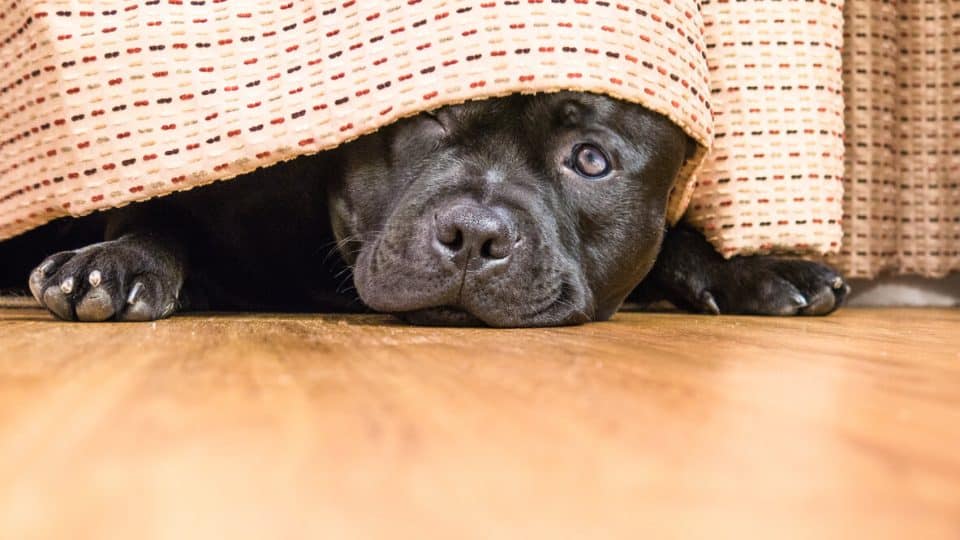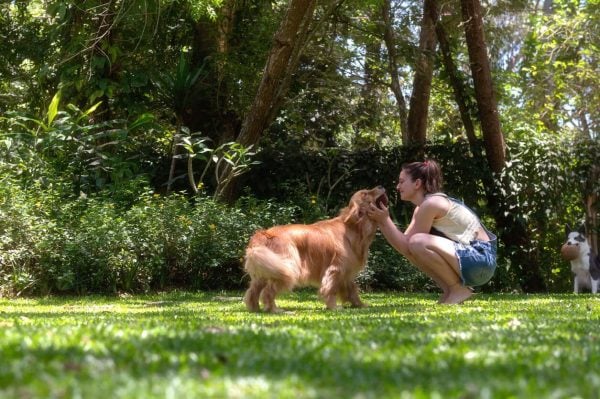- Not a substitute for professional veterinary help.
Ever felt like your dog was giving you the cold shoulder after you got back from vacation or took them to the vet?
Dogs don’t hold grudges in the way people do, explains Sarah Rutten, a force-free dog trainer, behaviorist, and founder of the Canine Perspective.
They’re not trying to punish you or get revenge, but dogs can form negative associations—and they may seem upset as they try to cope with those feelings. Dogs are generally very forgiving and adaptable, however, and kindness and consistency from you will help them recover.
Keep reading to learn how to tell if your dog is upset, how long those reactions typically last, and what you can do to support them. We’ll also address common questions to help you better understand your dog’s emotions.
What Is a Dog Grudge?
A dog grudge is an emotional response to an uncomfortable situation.
“Dogs don’t punish, they protect,” Rutten says.
To put it simply, your dog isn’t holding onto resentment if they avoid someone or seem upset after a stressful event. Instead, they’re reacting to how that experience felt and protecting themselves from further discomfort.
Dogs can have bad moods and feel anger, but this usually happens as a result of stress or unmet needs, like loud noises or hunger.
Signs Your Dog Is Upset About Something
If your dog has a negative experience and feels upset, Rutten says they may:
- Ignore or avoid you: Your dog may stay away or avoid eye contact after a scary incident, like a thunderstorm. This behavior usually means they feel anxious or unsafe and aren’t ready to interact yet.
- Show fear or nervousness: Trembling, tail tucking, or wide eyes often signal fear linked to a past negative experience. This happens when their body remembers what happened and prepares to stay safe.
- Refuse to respond or acknowledge you: When dogs don’t listen, they’re rarely being stubborn. It usually means they’re having a harder time processing commands because they’re stressed, confused, or overwhelmed.
- React defensively or aggressively: Growling, barking, or lunging often happen because of an association with a past unpleasant experience. For example, dogs may react to other dogs or people who remind them of a scary situation.
- Body block or guard their space: Standing in front of people or objects is often a request for space or resource guarding. This means your dog is trying to feel secure.
- Pace or seem restless: Constant movement or difficulty settling often indicates anxiety or heightened arousal. This can occur when a dog feels uncertain, like during a move to a new home or when unfamiliar guests arrive.
- Not take food from a specific person: If a dog won’t take treats or food from someone, they may feel uncomfortable around that person.
How Long Will My Dog Stay Upset?
Knowing how long a dog might hold a grudge or stay upset can help you decide whether to wait it out or take proactive steps to repair your bond.
Some dogs recover naturally with time. Even so, being intentional with positive experiences and gentle reassurance can often speed up their healing.
The duration of your dog’s reaction can vary, says Alexandra Bassett, a certified dog trainer and the lead behavior specialist at Dog Savvy.
Some dogs bounce back within minutes or hours, especially if something positive follows a mild unpleasant event. More serious incidents, like punishment, can affect dogs for days or weeks.
In cases of trauma or repeated negative experiences, fear-based associations may last months or even years.
Factors that influence how long a dog holds a grudge include:
- Short-term memory vs. long-term memory: Significant emotional events, like abuse, tend to be stored long-term.
- Previous experiences: Dogs with past trauma or neglect may be more sensitive to stress.
- Instinct and temperament: Breed, socialization, and personality affect how fears develop and persist.
- Context and consistency: Frequent exposure to triggers can strengthen negative associations and make recovery more difficult.
Helping Your Dog Through Negative Associations
If your dog seems withdrawn or upset after a stressful event, patience and the right approach can help them feel happy and safe again.
Bassett recommends the following steps to help your dog through negative experiences:
- Identify the source of the stress: Pay attention to your dog’s body language. Are they avoiding you? Do they seem tense or hesitant? Identifying recent experiences that might have caused fear or confusion is the first step toward healing.
- Create positive associations with counter-conditioning: Pair something your dog finds scary with something they love, like treats, toys, or praise. For example, if your dog seems afraid when you approach, calmly offer treats to help shift their response from fear to trust.
- Avoid triggers and rebuild slowly: Try to avoid tones, postures, or other triggers that upset your dog as you rebuild trust. Instead, offer a gentle presence to support their comfort.
- Use choice-based training games: Training that allows your dog to make choices, like an interactive toy they can play with at their own pace, offers a positive experience. This can also give them a sense of control and boost their confidence.
Frequently Asked Questions About Dog Emotions
Dogs don’t hold grudges, so to speak, but it may seem like they do in some situations. Answers to these common questions can help you better understand what your dog might be experiencing.
Do dogs hold grudges after being hurt?
When a dog is in pain due to abuse or an injury or other condition, they may react in a way that seems like they’re holding a grudge.
If a dog has experienced abuse, behavioral training with counterconditioning can help improve their response. If they’re experiencing other physical discomfort, veterinary treatment and at-home care can support their recovery and emotional well-being.
Do dogs hold grudges against other dogs?
About 20% of dogs are fearful of other dogs. During these interactions, they may show behaviors that seem like they’re holding a grudge, including avoidance, growling, or trembling.
Do dogs hold grudges against people?
Dogs can form negative associations with specific people based on past experiences. If your dog seems uncomfortable or avoidant around someone, they may be experiencing stress or anxiety. Consistent positive interactions can help rebuild their trust over time.
Is my dog holding a grudge because I left him alone?
Dogs with separation anxiety might be destructive while you’re gone or ignore you when you return. While this can make it seem like they’re holding a grudge, this is how they express stress from being alone—and tell you they need reassurance that you’re back and they’re safe!





